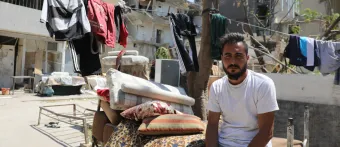Supporting Syrian Refugees amidst Lebanon’s Crises

Supporting Syrian Refugees amidst Lebanon’s Crises
Executive summary
Lebanon is in freefall amid numerous crises. The currency has collapsed, food prices have quadrupled in a year, and Covid-19 cases continue to rise after one of the strictest lockdowns in the world. More than half of Lebanese households now live below the poverty line and the government will soon be forced to end subsidies on basic goods. The country is approaching a national humanitarian emergency and widespread food insecurity.
Syrian refugees are especially vulnerable because the Lebanese government has curtailed their rights and restricted international support for them. More than 90 percent of Syrians in Lebanon now live in extreme poverty. However, the prospect of any imminent, voluntary return of large numbers of refugees to Syria remains distant. Numerous surveys with refugees confirm that they do not feel able to return to Syria, despite worsening conditions in Lebanon.
Lebanese are increasingly in need of economic support and feel ignored by the government and aid organisations. In this context, Lebanese leaders’ attempts to scapegoat refugees are gaining traction. Scapegoating refugees not only allows the political class to delay critical reforms but has also resulted in increasing inter-communal violence. As Lebanon’s freefall continues, the risk of more widespread violence increases.
Donors face a dilemma in how best to respond to the crises. The Lebanese political elite have steadfastly refused to implement necessary economic reforms to avoid collapse and have proved to be unsuitable partners for aid operations. To circumvent the government, donors have increased their support to local leaders in the hope that it can help create a more permissive environment for refugees with channelled support through local NGOs.
Humanitarians are now trying to meet the needs of vulnerable Lebanese, Syrian refugees, Palestinian refugees, and migrant workers in different humanitarian responses. Aid coordination is becoming a gargantuan task. Shifting to a country-wide or “Whole of Lebanon” response would better streamline the humanitarian response and ensure refugees and vulnerable Lebanese are treated equitably. Donors have little appetite for such an approach, but it could soon be the only viable option.
Interviews with international donors revealed a viewpoint that the United States is not capitalising on its potential influence on the refugee file in Lebanon. To maximise the United States’ potential to improve conditions for vulnerable Lebanese and Syrians, it must increase its participation in donor discussions in Beirut and devote more political capital to the issue.
The United States and other donors should use this political capital to take advantage of new openings to build the foundations of sustainable development for all. The changing context has created a few, though limited, opportunities to push for programs that are primarily framed as aiding Lebanese yet include refugees.
The ideas expressed are those of the author not the publisher or the author’s affiliation
Published in April 2021
All rights reserved to GCSP
Part of the Syria Transition Challenges Project
Will Todman is a fellow in the Middle East Program at the Center for Strategic and International Studies (CSIS) in Washington DC. His research focuses on humanitarian issues, displacement, and conflict in the Middle East, with an emphasis on the Levant. He has conducted field research in seven countries across the Middle East and North Africa, and his analysis has been published in peer-reviewed journals, by think tanks, and humanitarian organizations. Prior to joining CSIS, Will conducted research with Syrian refugees in Lebanon and Jordan for the Institute for the Study of International Migration. He previously lived in Beirut, where he worked at the British embassy and for the office of the UN special envoy to Syria. Will holds a B.A. in Arabic and modern Hebrew from Oxford University and an M.A. in Arab studies with a certificate in refugee and humanitarian emergencies from Georgetown University.

